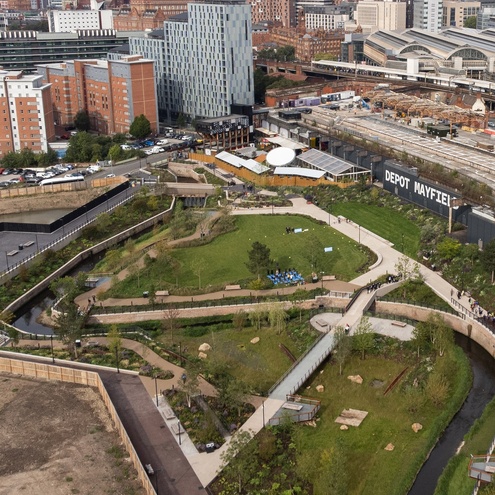Get updates from The Developer straight to your inbox Yes, please!
Mayfield Park, Manchester – The Mayfield Partnership (U+I, Manchester City Council, Transport for Greater Manchester and LCR) with Studio Egret West

Part of Manchester’s largest regeneration scheme, Mayfield Park is the city’s first new public park in over 100 years. What was industrial land is now home to diverse range of 120 mature and semi-mature trees of 43 different species, 120,000 plants and shrubs, wildflower and public lawns, tranquil riverside walkways and the city’s largest play area.
Who is on the project team?
The Mayfield Partnership.
• Masterplanner and landscape architect: Studio Egret West
• Park contractor: PP O’Connor
• Civil/structural engineer: Civic Engineers
• River engineer: Buro Happold
• Planning consultant: Deloitte
• Project manager/QS: Faithful & Gould
• Contractor landscape architect: Gillespies and Layer Studio
• Playground design: Massey & Harris
Describe the context of this project and its neighbourhood and people?
Mayfield Park’s story began in 2016 when U+I won a competition to develop the site with three public sector organisations, which together form the Mayfield Partnership. A Strategic Regeneration Framework, created with Bennetts Associates, set the overarching vision for the new urban neighbourhood and was formally adopted in 2018. Planning consent for the first phase, comprising the park, two offices buildings and a car park, was received in 2020 and work started on site later that year.
Located next to the city’s Piccadilly train station, Mayfield Park provides Manchester city centre with a family-friendly, inclusive green space with major ecological and sustainability benefits, in an area that was the epicentre of the British textiles industry during the Industrial Revolution.
Construction on the first phase started in 2020 following receipt of £23m investment from the Government’s Getting Building Fund. As part of its strategy to support ‘shovel ready’ schemes that will help to drive economic recovery, this grant recognised Mayfield’s significance for delivering on many Government metrics, from its abundance of green space to wellbeing benefits. Mayfield Park opened in September 2022 – a beautiful and safe urban oasis in the beating heart of Manchester.
Tell us what you did and how the project enlivened the place?
The success of Mayfield Park is evident not only in the transformation from brownfield to lush greenery, but also in the way it is used. Hundreds, if not thousands, of people visit every day – whether to walk their dog, take their kids to the play area or go for a run. It is already embedded into the fabric of Manchester.
The River Medlock, which was previously buried under a concrete culvert, has been uncovered and restored to flow through the centre of the park – it has already attracted kingfishers, brown trout, ducks and Canadian geese.
To mark Mayfield Park’s opening, local schoolchildren took part in various wellbeing inspired activities, from meditation to football, to highlight the importance of green space to quality of life. The park has become a place for people to spend time together, whether for exercise or relaxation. It has also played host to large scale events, including Manchester’s first Bonfire Night celebrations since the start of the pandemic.
Leisure destination Escape to Freight Island also opened adjacent to the park in 2020. By offering the best in food, drink and entertainment, people have been able to socialise whilst getting a glimpse of Mayfield’s future.
Did the project make a positive social and environmental contribution?
The park’s positive environmental impact is evident in the landscape approach, which creates planting communities similar to that found in nature: a ‘designed ecology’, where art and science combine to create richly-vegetated and floral landscapes that boost ecosystems and seasonal interest, all the while creating a more sensory experience for human visitors. In line with Manchester’s Green and Blue Infrastructure Strategy, Mayfield is transforming industrialised watercourses back into wildlife corridors, weaving nature into the city and connecting to the surrounding countryside.
Mayfield Park is an exemplar for sustainable and inclusive urban regeneration that benefits both people and planet. The 11-acres of green infrastructure provide considerable social and environmental benefits, including:
• Providing increased access to natural space
• Improving long-term air pollution through substantial tree planting
• Helping to regulate the local climate through increased tree canopy coverage and shading
• Reducing long-term noise pollution from nearby roads and railway
• Creating new habitats for wildlife.
Mayfield Park has made a significant positive social and environmental impact on both the site and Manchester more widely, during its construction and since its completion. In fact, a Real Worth report forecast that Mayfield will generate £49.5m in social and environmental value between 2020-2024. Of this, £20.6m is attributed to wellbeing benefits, as people feel safer and more positive about improvements to the public realm.
Sign up to our newsletter
Get updates from The Developer straight to your inbox
Thanks to our organisation members
© Festival of Place - Tweak Ltd., 124 City Road, London, EC1V 2NX. Tel: 020 3326 7238